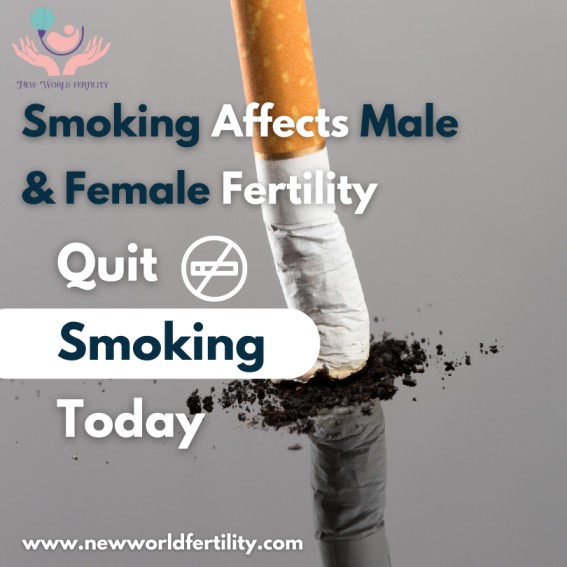| New World Fertility
Introduction: The Silent Fertility Saboteur
For millions dreaming of starting or expanding their family, fertility can often feel like a mysterious puzzle. While many focus on age, diet, or genetics, one factor quietly undermining fertility is smoking. Smoking—whether cigarettes, vaping, or other tobacco products—is a major, yet often overlooked, enemy of reproductive health in both men and women.
At New World Fertility, we’ve seen firsthand how quitting smoking can transform fertility outcomes, making the journey to parenthood smoother and more hopeful. Let’s dive into how smoking affects fertility, unravel the science, and explore actionable steps to protect your reproductive future.
How Smoking Affects Male Fertility
1. Decline in Sperm Quality
Smoking introduces harmful toxins such as nicotine, carbon monoxide, and heavy metals into the bloodstream, which directly affect sperm production. Studies show that smokers often have:
-
Lower sperm count: Reduced number of sperm available for fertilization
-
Poor motility: Sperm swim slower or erratically, reducing chances to reach the egg
-
Abnormal morphology: Increased percentage of misshapen sperm that can't fertilize eggs effectively
2. DNA Damage in Sperm
Toxins from smoking cause oxidative stress, leading to DNA fragmentation in sperm. This genetic damage not only lowers fertilization rates but also increases the risk of miscarriage and health problems in offspring.
3. Hormonal Imbalances
Nicotine and other chemicals interfere with testosterone production, resulting in lowered libido and erectile dysfunction, further complicating conception.
How Smoking Affects Female Fertility
1. Decreased Ovarian Reserve
Smoking accelerates the loss of eggs in the ovaries, effectively aging the ovaries faster than the natural biological clock. This means smokers experience menopause earlier and have fewer eggs available for fertilization.
2. Impaired Egg Quality
Similar to men, oxidative stress damages the eggs, reducing their quality. Poor-quality eggs decrease the chances of successful fertilization and embryo development.
3. Altered Hormone Levels
Smoking disrupts the balance of reproductive hormones such as estrogen and progesterone, which are critical for ovulation and preparing the uterus for implantation.
4. Damage to the Fallopian Tubes and Uterus
Chemicals in tobacco smoke can damage the delicate tissues of the fallopian tubes and uterus, increasing the risk of ectopic pregnancy, implantation failure, and miscarriage.
Psychological & Emotional Impact
Beyond the physical effects, smoking’s impact on fertility can cause profound emotional distress. Couples struggling with unexplained infertility often face feelings of frustration, guilt, and anxiety. Understanding the role of smoking can empower lifestyle changes that restore hope and control over fertility outcomes.
The Good News: Quitting Smoking Improves Fertility
The body begins to heal soon after quitting smoking. Research shows that:
-
Men’s sperm quality improves after 3 months of cessation
-
Women’s ovarian function and egg quality show significant recovery within months
-
Overall pregnancy rates increase and miscarriage risks decrease with smoking cessation
At New World Fertility, we encourage all patients to seek support for quitting smoking as an essential step in their fertility journey.
How New World Fertility Supports You
We understand that quitting smoking can be challenging, especially when dealing with fertility stress. Our experts provide personalized counseling, nutritional guidance, and support programs tailored to optimize your reproductive health holistically.
FAQs: Smoking and Fertility
Q1: How long after quitting smoking can fertility improve?
A: Men can see improvements in sperm quality within 3-6 months, while women may notice hormonal and egg quality improvements within a few months to a year.
Q2: Does vaping affect fertility similarly to smoking?
A: Yes, vaping also exposes the body to harmful chemicals and nicotine, which can negatively impact fertility in both men and women.
Q3: Can smoking cause infertility even if I’m young?
A: Absolutely. Smoking accelerates reproductive aging and damages sperm and eggs regardless of age.
Q4: Does secondhand smoke affect fertility?
A: Yes, exposure to secondhand smoke can also reduce fertility in both men and women by causing similar oxidative damage.
Q5: Are there fertility treatments that can overcome smoking-related infertility?
A: Treatments like IVF can help, but quitting smoking enhances success rates significantly and improves overall reproductive health.
Conclusion: Take Charge of Your Fertility Today
Smoking is a hidden barrier that drastically reduces your chances of conception and a healthy pregnancy. Whether you’re just beginning your fertility journey or exploring advanced treatments, quitting smoking is one of the most powerful actions you can take.
For expert guidance and compassionate care tailored to your unique needs, visit New World Fertility and take the first step toward turning your dreams of parenthood into reality.

 Jun-29-2025
Jun-29-2025